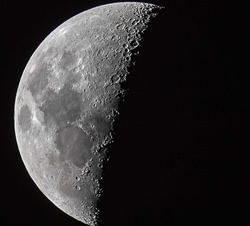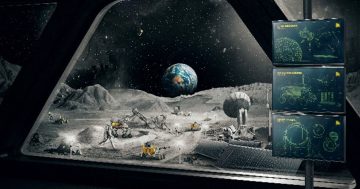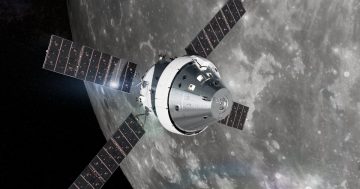Mark Kaufman* says the 21st century space race may is a little different to what we imagined.
 The darkest places on the moon’s surface haven’t seen light in billions of years. Inside these lightless craters, temperatures can plummet to minus 391 degrees Fahrenheit.
The darkest places on the moon’s surface haven’t seen light in billions of years. Inside these lightless craters, temperatures can plummet to minus 391 degrees Fahrenheit.
It’s one of the most extreme places in our solar system, but that’s where NASA is going.
Because that’s where the water is.
The U.S. space agency, now equipped with a powerful new megarocket, is preparing to establish a base on the moon, a venture that will allow NASA to journey into even deeper space.
Harvesting this ice, the space agency says, is crucial for making drinkable water, oxygen, and fuel for rockets.
As soon as 2025, astronauts may land near enticing craters in the shadowy lunar south pole.
They’ll have their eyes on the prize.
A NASA rover will, too.
Yet the U.S. and other countries with lunar ambitions can’t legally claim any territory or sovereignty on the moon.
Amid the first space race in the 1960s, many global nations signed the Outer Space Treaty, which prohibits any country from owning parts of space.
But harvesting extraterrestrial resources is shaping up to be a different story.
It’s now inevitable that natural riches will be mined from other worlds, especially as the 21st century space race heats up.
In the new cosmic frontier, who will be allowed to take what, and where? It’s a murky geopolitical realm — with some partial-answers, and many more questions.
“Nothing is simple,” Joanne Gabrynowicz, professor emerita and former director at the National Center for Remote Sensing, Air, and Space Law of the University of Mississippi School of Law, told Mashable, in reference to lunar resource extraction.
“There are currently no clear moon specific rules.”
But there ought to be, soon.
“It is a fact: we’re in a space race,” NASA administrator Bill Nelson recently told Politico, while speaking about China’s rapidly advancing technological space prowess.
And the race is, once again, to the moon.
The need to harvest ice
The Outer Space Treaty bans ownership of the moon.
But it allows nations to freely explore it (“…outer space shall be free for exploration and use by all States;”).
Pioneering Apollo astronauts certainly used, and relied, on the moon.
They used it to dump poop, drive around, plunge tubes into the soil, take samples, play golf, plant flags, leave mementos, run experiments, and beyond.
But these astronauts stayed on the moon for, at most, a few days.
Staying weeks, or longer, while supporting numerous people and diverse scientific operations will at some point require using lunar water.
It’s inherent to the long-term exploration of another world.
A cubic meter of water weighs well over a ton — a huge “shipping” challenge.
So any explorers will depend on water resources at their destination (in addition to drinking water recycled from sweat and urine, like astronauts aboard the space station).
NASA astronauts, then, might harvest moon ice even before there are clear laws on what resources a nation — for the needs of exploration — can extract from the moon.
The space agency expects moon ice will “fuel” their lunar base.
NASA has written and signed the Artemis Accords — broad, non-binding principles for cooperating peacefully in space — that include a succinct section on “Space Resources.” As of January 2023, 23 nations have signed.
“The Signatories note that the utilization of space resources can benefit humankind by providing critical support for safe and sustainable operations,” the hopeful document reads.
But what if a private company — not a nation — found bounties of ice in the lunar south pole, and excavated it?
Can they claim the ice?
Could they hypothetically sell it to a government, who might need it to make air and fuel, for a sizable profit?
The Outer Space Treaty is silent about the private sector.
This is where many issues over lunar resources arise.
Who can own lunar resources?
We’re starting to get a clearer picture of who will be able to claim, and sell, lunar resources.
Four nations have laws recognizing that a private company can extract resources in outer space: the U.S., Luxembourg (a wealthy nation with many space companies), Japan, and the United Arab Emirates.
Their approaches are not exactly the same, but the leading interpretation resembles international law governing the high seas, explained Frans von der Dunk, a professor of space law at the University of Nebraska-Lincoln.
On Earth, no single nation can occupy or claim the majority of the ocean (the “high seas”).
A fishing vessel can freely travel through these international waters and harvest the rich fish and tentacled resources therein – as long as they have a license from their home state and abide by relevant international laws, like on pollution or the conservation of species.
“Once the fish are in the net of fishermen, they can sell it,” von der Dunk told Mashable.
“But no country can point to any part of the high seas and claim the fish; that would be claiming territorial sovereignty.
“There are currently no clear rules.”
How might this regime work on the moon?
No nation could point at a crater and claim the ice therein.
But, a company could journey to a crater, set-up shop, and extract resources.
And then, presumably, these private miners can sell the ice to whomever is buying.
And those buyers will likely be deep-pocketed space agencies with ambitions to visit the Red Planet, or perhaps metal-rich asteroids.
*Mark Kaufman is the Science Editor at Mashable.
This article first appeared at mashable.com








